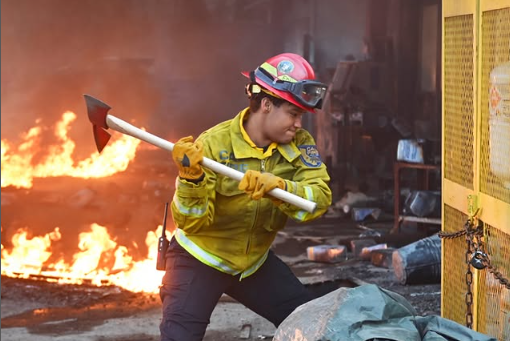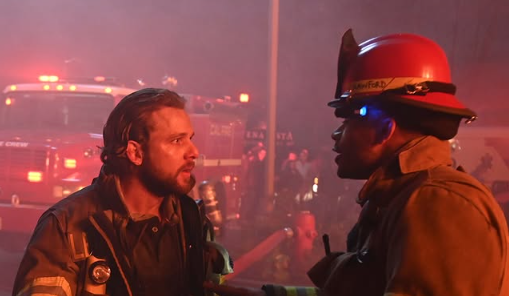
The Power of Personal Redemption
In Fire Country, the most powerful infernos aren’t just the blazing wildfires — they’re the emotional ones burning inside the people fighting them. While the series is packed with action and danger, its true strength lies in the emotional narrative of redemption and the painful journey of making amends. This is especially true for the show’s central character, Bode Donovan, a former convict fighting wildfires with the California Conservation Camp program.
Redemption in Fire Country isn’t offered easily, and it doesn’t come wrapped in absolution. Instead, it comes covered in ash, soaked in sweat, and burdened with the weight of hard choices. It’s about men and women standing in the fire — both literal and emotional — and daring to hope they can be more than their worst mistakes.
Bode’s story reflects a universal question: Can someone ever truly earn forgiveness — from others and from themselves?
Bode Donovan: A Flawed Hero on a Redemptive Path
Bode isn’t your typical firefighter hero. He’s raw, angry, deeply remorseful, and emotionally guarded. But he’s also fiercely loyal, principled in his own way, and unshakably determined to make up for his past. His decision to join the Three Rock inmate firefighter program is not just about shaving time off his sentence — it’s a personal mission to reclaim the dignity he believes he lost.
The show doesn’t shy away from Bode’s flaws. His past mistakes — which led to prison time and the alienation of his family — are not brushed aside. Instead, they serve as the emotional fuel for his journey. Each fire he fights becomes a metaphor for the battle he wages within himself.
We see this most powerfully in his interactions with his parents, Vince and Sharon Leone. Their complicated history, full of pain, resentment, and unspoken love, gives Bode’s story emotional richness. He’s not just fighting for freedom — he’s fighting to be someone his family can believe in again.
Second Chances Amid the Flames
The Three Rock Conservation Camp provides a compelling setting for the redemption arc — a place where people society has cast aside are given the chance to serve, to protect, and to heal. The show brilliantly uses this real-world program as a backdrop to explore themes of transformation.
Here, inmates are not just inmates. They are fathers, sons, brothers, and friends. They put themselves in danger every day, not for glory, but for purpose. Through grueling physical labor and harrowing missions, they rediscover self-worth.
For Bode and his fellow firefighters, every wildfire is both a threat and an opportunity: a threat to life, and an opportunity to prove they are more than the labels they’ve been given.
This theme isn’t just about firefighting — it’s about the fight for personal redemption in a world quick to judge and slow to forgive.
The Firefighters Around Him: Redemption Is Contagious

Though Bode is the emotional core of the show, Fire Country wisely extends its redemptive lens to the people around him. Each character grapples with their own demons, their own regrets, and their own need to be seen in a new light.
Manny Perez, the captain of the inmate crew and a recovering alcoholic, is a man trying to lead while battling his past failures. His relationship with his daughter Gabriela is fraught with mistrust and longing, and his leadership at Three Rock is both his penance and his salvation.
Sharon Leone, Bode’s mother, carries the emotional burden of a mother’s broken heart. Her belief in her son never quite fades, but it wavers under the weight of disappointment and pain. As she struggles with her own health issues, Sharon’s journey becomes a story of maternal redemption — trying to protect her son while still holding him accountable.
Even Gabriela, Bode’s childhood friend and now a firefighter herself, walks a tightrope between past and present. Her evolving relationship with Bode mirrors the audience’s conflicted feelings: can love survive betrayal? Can trust be rebuilt?
In Fire Country, redemption is not isolated — it ripples outward, touching everyone in its path.
Confronting the Community’s Judgment
One of the most compelling elements of Fire Country is how it portrays the harsh, unforgiving nature of small-town memory. Edgewater, Bode’s hometown, doesn’t easily forget the pain he caused — and that pain lingers in every sideways glance and quiet accusation.
Bode’s return isn’t met with open arms. Instead, he’s often forced to walk the tightrope between hero and pariah. The same man who runs into burning buildings to save strangers is still the guy some in town consider a criminal. This dichotomy — the tension between who he was and who he’s trying to be — adds layers to the drama.
Through these community dynamics, the show asks a broader societal question: Are we too quick to brand people by their worst mistake? And if so, what does that say about us?
The Reality of Forgiveness: Not Always Clean, Not Always Complete
Fire Country is honest about the fact that not everyone gets their happy ending. Sometimes redemption is partial. Sometimes forgiveness is denied. And sometimes, the people seeking it never get the closure they crave.
But that’s what makes the show resonate.
It reflects real life — messy, painful, hopeful, and unfinished. The characters stumble, regress, lash out, and fall short. Yet they keep trying. And in that constant effort, the show finds its emotional core.
Because Fire Country isn’t really about fire. It’s about the struggle to find your place in a world that’s already written you off.
Redemption as a Universal Theme
Ultimately, what makes Fire Country special is that it taps into something universal: the desire to be seen, to be forgiven, and to start over.
Every viewer, whether they’ve made life-altering mistakes or just wish they could take back a few words, understands the need for second chances. The series captures that longing with sincerity and depth.
Through every fireline crossed, every life saved, and every family dinner awkwardly shared, the show gently reminds us: We are not the worst thing we’ve ever done. We are what we choose to do next.
